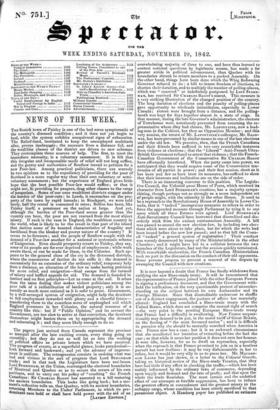NEWS OF THE WEEK.
Tits Scotch town of Paisley is one of the bad sores symptomatic of the country's diseased condition ; and it does not yet begin to Tits Scotch town of Paisley is one of the bad sores symptomatic of the country's diseased condition ; and it does not yet begin to
heal, while the system exhibits unequivocal signs of exhaustion. The Relief-fund, instituted to keep the unemployed multitude alive, proves inadecmote ; the succours from a distance fail, and the wealthier classes of the district are driven to new schemes. They contemplate three sources of help. The first, to meet the immediate necessity, is a voluntary assessment. It is felt that this irregular and irresponsible mode of relief will not long suffice, and the gentry and authorities of Renfrew intend to petition for a new Poor-law. Among practical politicians, there can scarcely be two opinions as to the expediency of providing for the poor of Scotland in a more regular way than their own voluntary or semi- voluntary assessment ; but the experience of England gives little hope that the best possible Poor-law would suffice ; or that it might not, hi providing for paupers, drag other classes to the verge of pauperism. Some of our once wealthiest districts stagger under the burden of the poor-rate : in Leeds, it encroaches on the pro- perty of the town by rapid inroads ; in Stockport, we were told lately, half the rental is consumed in rates ; Bolron has been, like Paisley itself; a pensioner on the nation at large. And yet, although the burden of the Poor-fund seems greater than the country can bear, the poor are not rescued from the most abject misery. If such is the ease in England, the wealthiest country in the world, what is likely to be the result in that part of the island that derives some of its boasted characteristics of frugality and hardihood from the bleaker and poorer nature of the country ? It seems to be foreseen ; and the people of Renfrew couple with the demand of a Poor-law another for a national or systematic scheme of Emigration. Even should prosperity return to Paisley, they say, some of its people are for ever deprived of employment ; while work awaits theni, or can be made for them, in the Colonies. Such ap- pears to be the general close of the cry in the distressed districts, where the manceuvres of faction do not stifle it : the demand is successively for an extension of the ordinary relief, temporary help from a distance, an alteration of the law to make lasting provision for more relief, and emigration—final escape from the turmoil of misery and baffled appeals for aid. The demand is founded in instinct and on first principles—Let us come at the soil. It arises from the same feeling that makes violent politicians among the Poor talk of ti redistribution of landed property ; only it is as- suredly as much more rational as it is safer to grant. Government, by a well-arranged sykem of emigration, might help the destitute to full employment' rewarded with plenty and a cheerful future— transferring them to the countless acres of unploughed soil which England possesses in her Colonies, the natural resource of a country like this : but if "Public Opinion," and its servant the Government, are too slow to arrive at that conviction, the destitute themselves might hasten them on by appropriating the demand and reiterating it ; and they seem likely enough to do so.


























